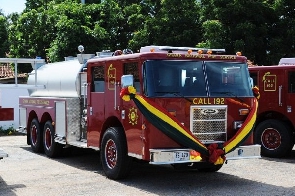The Ghana National Fire Service (GNFS) said it is collaborating with national security and the various telecommunication companies to trace the identity of persons who make prank calls to its emergency numbers.
The collaboration was necessitated by the fact that, the GNFS did not have the technology and gadgets to know the prank callers.
The Tema Regional Public Relations Officer of the GNFS, Divisional Officer Grade Two (DO II) Ellis Okoe-Robbison, In an interview with the Ghanaian Times yesterday, explained that the GNFS had no mandate to prosecute people who make prank calls, but said since prank calls were an offence by law, persons arrested would be handed over to the police for prosecution.
DO II Okoe-Robertson’s comment followed the worry expressed by the Second-in-Command for the region, Divisional Officer Grade One (DO1) Timothy Osafo-Affum that, on average the GNFS receives about 120 prank calls a day.
The highest, he said, were calls made when schools were on vacation and “many children are at home.”
DO II Okoe-Robertson said, “these calls are also made by adults, and especially men, who call to propose love to GNFS female personnel on duty.”
He also said, while some members of the public call to insult them, others stay silent on the line; the rest either call to tell jokes or mention places where there were no fire outbreaks at all.
DO1 Osafo-Affum, however, told the Times that the Command had devised means to tell the difference between prank calls and real calls.
This, he said had reduced the “wild goose chase” by 50 per cent, “so we don’t have to unnecessarily risk the lives of personnel and also misuse logistics.”
DO1 Osafo-Affum cautioned members of the public who make prank calls to desist from that, because their actions were detrimental to the progress of their communities and might sometimes prevent others who genuinely need help from getting them.
He said, but for the unwillingness of telecommunications networks to provide the details of such callers, many of such prank callers would have been prosecuted to deter others from doing same.
General News of Tuesday, 11 February 2020
Source: ghanaiantimes.com.gh

















